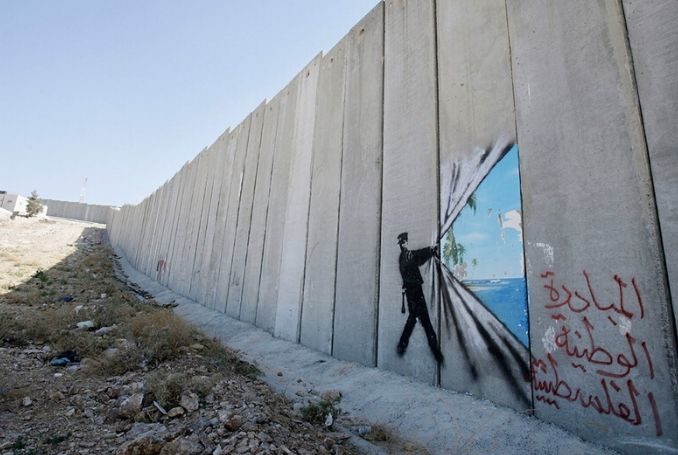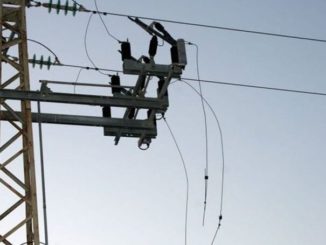
By Blake Alcott
It’s nice that a group of 127 British politicians has discovered the as-yet unused tool for pressuring Israel: sanctions, the ‘S’ in Boycott, Divestment and Sanctions (BDS). They wrote a letter to Boris Johnson asking him to impose such sanctions if Israel annexes roughly half of the West Bank – which it just might do this summer.
Actually, many Palestinians believe annexation even of the entire West Bank would be a good thing insofar as it would make Israeli apartheid plain and visible to everybody. That would force world opinion to apply its anti-apartheid standards to historic Palestine and insist on equal rights for everybody between the river and the sea.
Even without this insight, however, the letter is milk toast. It latches onto only the most egregious of Israeli actions – de jure annexation of territory already de facto annexed. It leaves unchallenged countless Israeli actions such as mass murder in Gaza, home and village demolitions, discrimination against the Palestinians in Israel, and its defining itself in July 2018 as a racist state by means of the Nation State Basic Law. The list goes on and on.
The letter is a legalistic gripe that doesn’t mention history or basic ethics. Yes, it is true that “acquisition of territory through war is prohibited” and annexing such territory violates international law, but what about the annexation of Greater Jerusalem in 1967 or, for that matter, of the bulk of historic Palestine in 1948? What about absolute rule over the West Bank and the siege of Gaza without annexation?
The politicians’ main gripe, though, is that annexation would be “a mortal blow to… any viable two-state solution.” Beloved by all of the signees, that is the Zionist solution which leaves the Israeli apartheid state intact within the 1948-occupied territories. It also leaves the 7 million Palestinian refugees out in the cold.
Any two-state solution would be crassly unjust, but this group of British politicians thinks it would be great, and that its possibility be kept alive, because that is the only way to save Israel in the long run (albeit on only about 80% of Palestinian land). And these signees are allegedly the Palestinians’ friends.
Palestine’s So-called Friends
Their letter is actually a symptom of a deeper intellectual bankruptcy and of the impotence of the forces in political Britain claiming solidarity with Palestine. They all support the Zionist two-state solution.
The Parliamentary group ‘Labour Friends of Palestine and the Middle East’ (LFPME), for instance, “supports a two state solution that creates a viable and contiguous Palestinian state” – and that preserves the viable and contiguous Jewish state. It to be sure urges boycott of West Bank-settlement goods, but trips over itself in a rush to assure the public that this “is categorically not an anti-Israeli policy, but an anti-settlement policy” and that this should not be taken for support of BDS, “which is widely considered to be obstructive to the two state solution.”
91 MPs are members of LFPME, and 24 of them signed the letter. Not among them, curiously, is the Chair of LFPME, Lisa Nandy, who has herself taken incoherent positions on Palestine, describing herself at once as a Zionist but broadly supporting the Palestinians’ right of return. She clearly leans toward Israel, saying she was “honored” by the support of the rabidly pro-Israel Jewish Labour Movement and that under Jeremy Corbyn, the most pro-Palestinian British politician ever, Labour “gave the green light to anti-Semites”.
Three of the signees against annexation are even members of Labour Friends of Israel (LFI) – Lilian Greenwood, Peter Hain, and Margaret Hodge. On that group’s website, the headline reads ‘Working towards a Two-State Solution’. It “promotes a negotiated two state solution for two peoples; with Israel safe, secure and recognized within its borders living alongside a democratic, independent Palestinian state [and] seeks to strengthen relations between Britain and Israel.”
At first glance, it is astounding that of LFI’s 55 MP members, 24 of them are also members of LFPME! They include such well-known figures as Liam Byrne, Angela Eagle, Emily Thornberry, Liz Kendall, Wes Streeting, David Lammy, Jess Phillips, Chris Bryant, and Rosie Winterton. But astonishment vanishes when one realizes that the goal of the two groups is the same: Israel safe and secure in the Near East, legitimate for all time, ‘alongside’ a rump statelet they are cheeky enough to call ‘Palestine’.
LFI Chair Steve McCabe MP rides hard against a new category of racism: “anti-Zionist antisemitism”. In the Jewish Chronicle of 7 April 2020, he pledged to “vigorously oppose the divisive effort to demonize and delegitimize the Jewish state led by the BDS movement.” Perhaps, were LFPME to endorse BDS in so many words – which to my knowledge it does not – MPs would see that they must choose between LFI and LFPME.
Corbyn as Labour leader from 2015-2020 not only unfailingly supported the two-state solution and Israel’s ‘right to exist’, but failed to deal with the Party’s phony, alleged ‘antisemitism crisis’. He did not make clear that criticism of Israel is not antisemitic because any settler-colonial state in Palestine – whether Jewish, Christian, Muslim, or British – would face the same fundamental criticism, namely that it by definition dispossesses the Palestinians.
Tragically, Corbyn also allowed anti-racist upholders of human rights such as Ken Livingstone, Jackie Walker, Marc Wadsworth and Chris Williamson to be expelled from the Labour Party merely for making various factual comments, mostly about Zionism. Lacking any clear and principled ideology, Labour under Corbyn diminished and tainted the voices of many staunch pro-Palestinians.
What’s more, all the candidates to replace Corbyn – Keir Starmer, Nandy, Rebecca Long-Bailey, etc. – bent the knee to those who do have a coherent ideology and control the narrative in Britain: the Zionists. During the leadership campaign all of them endorsed the so-called “Ten pledges to end the antisemitism crisis” written by the Israel-lobby group Board of Deputies of British Jews. Two of the pledges are 1) to see to it that “Ken Livingstone and Jackie Walker… will never be readmitted to membership” and 2) to “adopt the international definition of antisemitism without qualification”.
That definition of antisemitism is, of course, the notoriously illogical one put out by the International Holocaust Remembrance Alliance (IHRA). It conflates politics and racism and includes amongst the “manifestations” of antisemitism the “targeting of the state of Israel, conceived as a Jewish collectivity”, “denying the Jewish people their right to self-determination, e.g., by claiming that the existence of a State of Israel is a racist endeavor”, and “drawing comparisons of contemporary Israeli policy to that of the Nazis.”
The Labour Party obeys the pro-Israel forces, but rest assured, things are no better within the Conservative and Liberal Democrat Parties, nor at The Guardian or any other British newspaper. Truly, ‘with friends like these,…’ No, that’s not quite right. The Palestinians have no friends in British politics.
Why Such Weakness?
The question is Why? A big reason is that within Palestinian and Palestine-solidarity circles there is, in Britain, no coherent intellectual analysis of what is just or unjust, and no vision of a solution.
Nobody in political circles even talks about the three comprehensive demands of BDS (return, equality within Israel, and liberation for the West Bank and Gaza Strip). Talk is only of BDS tactics and its danger to Israel.
Instead, as with the anti-annexation letter, small skirmishes are fought within the Zionist two-state paradigm, symbolically making oppression a little more tolerable and in effect distracting from the fundamental issues that would make sense to the British public, if enunciated.
One ‘solidarity’ wing is Zionist: Israel has every right to continue as it is, as a discriminatory state on the 1967 borders. The perfect representative of this wing is the U.K.’s only Palestinian MP, Liberal Democrat Layla Moran, who wrote in the Guardian in 2019 of her fear of being called ‘antisemitic’ and who stressed that she “believes in Israel’s right to exist.” Also: “I believe in a two-state solution [which] is at best in stasis, at worst it is teetering on the brink of a precipice. It needs a lifeline.”
The other wing is BDS, which starts not with a position against Israel but rather for all the rights of all the Palestinians. Its three demands strictly imply Two Democratic States, and neither of them are Jewish or any other ethnocracy. (The two would undoubtedly merge, resulting in One Democratic State, but that is a separate topic.)
As Omar Barghouti, one of the main originators and propounders of BDS, said a few years ago, “A Jewish state in Palestine, in any shape or form, cannot but contradict the basic rights of the land’s indigenous Palestinian population… No Palestinian, rational Palestinian, not a sell-out Palestinian, will ever accept a Jewish state in Palestine.”
So the cat’s already out of the bag. What is now needed is for both Palestinians and their supporters to publicly and fearlessly embrace Barghouti’s clarity – to unabashedly say Yes, a racist, apartheid state should obviously be replaced by a normal, human rights-based, ethnicity-blind democracy. To boot, in my experience most people on the street understand this without any difficulty.
It would both constitute a clear intellectual narrative and enormously help campaigning in countries like the U.K. It is now impossible to explain to the public – or for that matter to MPs when one lobbies them – what solution would embody the fulfillment of Palestinians’ rights, or ‘what the Palestinians want’. By contrast, international supporters of the Black freedom struggle in South Africa were able to draw upon a clear vision while arguing the case in the West; Palestine activists lack any such inspiring vision, one which openly, in easy-to-understand terms, states the political goal.
But the BDS Call describing the rights to be fulfilled is kept at a flickering flame. Hardly anyone ventures outside the pro-Zionist framework of the parliamentary Friends of Palestine and, for that matter, the co-opted leaders of the Palestinian Authority. The best that well-meaning British politicians have to hold onto are sporadic, justified but non-essential incidents like the annexation of Area C in the West Bank.
Palestine’s supporters are waiting for open acknowledgment of the consequences of the BDS demands. Only that will enable a refutation of charges of antisemitism – because it would offer a clear, motivating, positive vision which doesn’t even have to mention the Jewishness of the present occupying state, Israel.
– Blake Alcott is an ecological economist and the director of One Democratic State in Palestine (England) Limited. The author welcomes any information on ODS or bi-nationalism activity sent to blakeley@bluewin.ch. He contributed this article to The Palestine Chronicle.

– Blake Alcott is a retired cabinetmaker and ecological economist who has been a solidarity activist since 2010, now living in Zürich. He is Director of ODS in Palestine (UK), an NGO working to make One Democratic State more understandable to the public. His 2023 book, The Rape of Palestine: A Mandate Chronology, consists of 490 instances of the dialogue, such as it was, between the British and the Palestinians during the years 1917-1948. He contributed this article to The Palestine Chronicle








The British left is held back by its refusal to break with the Labour Party, and has instead covered for every capitulation made by the party and Corbyn including on Palestine. Just try criticising the LP at a PSC meeting! Or take Stand Up To Racism, which is so eager not to cause issues for its President Diane Abbott that it’s allowed an openly Zionist group to march in their “anti-racist” march in Glasgow for the last three years and undermined those opposing it.
I’ve heard it said that Sylvia Pankhurst, when asked why there hasn’t been a revolution in Britain, replied with three words: “The Labour Party.” You could say the same for the absence of a strong anti-Zionist movement.